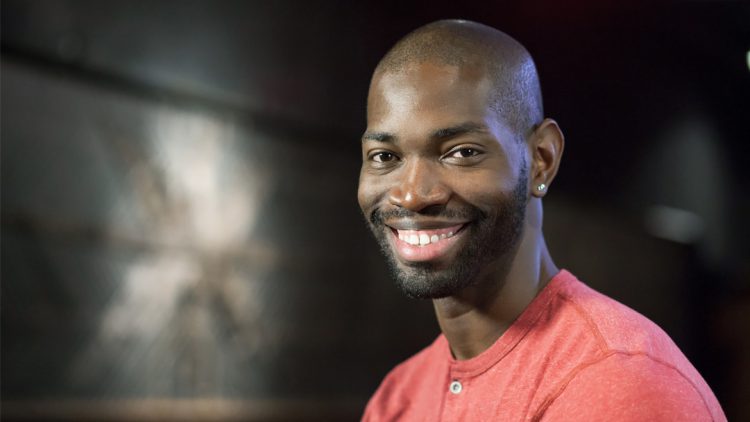It was the kind of fateful coincidence that makes you think that Tarell Alvin McCraney’s story was so urgent, and the moment so precise, that fortune intervened to ensure that it was shared.
In 2003, just after completing his bachelor’s degree in theater at DePaul University, McCraney, a New World School of the Arts alumnus and 2013 MacArthur “genius” grant recipient, wrote a memoir of his turbulent childhood growing up in the Liberty City housing projects. Amidst the strife, McCraney was befriended by a drug dealer who became a surrogate caretaker.
The script, entitled In Moonlight Black Boys Look Blue, was rooted in themes that are not frequently addressed frankly in the broader American cultural landscape: the recognition and development of gay sexuality in adolescence; coming of age as a black man; and the experience of poverty and drug abuse in the family. “Those moments haunted me and continue to haunt me,” McCraney said. “I think one of the reasons for writing the piece was to figure out how that worked, how those moments play out in my everyday life. I do know that those moments don’t leave you, so perhaps they have something to do with the way in which I work today, and the way in which this project came about.”
“The root of his experience was also the root of my experience.”
McCraney put his script aside for almost a decade, but then, through a series of unforeseeable events, it fell into the hands of director Barry Jenkins. Jenkins had grown up in the exact same Liberty City projects at the exact same time McCraney had. The two had never met.
Jenkins, whose first feature, the enigmatic Medicine for Melancholy, was released to critical acclaim in 2008, was captivated by the story, which seemed almost clairvoyant in the way it mirrored aspects of Jenkins’ own experience. “I saw it as an opportunity to get some of my own childhood memories out of my head and onto the screen, filtered through Tarell’s wonderful voice,” he said. “The root of his experience was also the root of my experience.” Jenkins immediately began adapting McCraney’s manuscript into a feature film. It is now in nationwide release.
Moonlight synthesizes grit and beauty both thematically and in its manifestation on the screen. In doing so it retains the difficult but scrupulous ambiguity at the core of McCraney’s original vision, a vision for which any simplification would have eroded its truth. Unvarnished scenes of physical and psychological violence are portrayed next to lovingly shot sequences on a night beach, or a lyrical passage where the drug dealer teaches the young protagonist to swim in the ocean. “The complexity of those moments is key,” McCraney said. “Someone known for creating violence, a drug dealer, gave me some of the most peaceful and kind moments in my life, while someone that you think of as the most nurturing, my mother, who should have been the bedrock in my life, caused a lot of chaos.”
“That time was life-changing, and I got a world-class education with some of the best practitioners in the state.”
The refusal of McCraney and Jenkins to force anodyne resolutions onto the more wrenching aspects of the story and its telling creates an opportunity for the audience to experience the film in an authentic way. “The film is a fully realized piece, but there is so much space in it, and I think people fill in those spaces with themselves, which is kind of remarkable” said McCraney. “Not every piece of work that I’ve done has been open in that way – and they don’t need to be – but this one is. I feel that, especially with a general audience, they’re allowed to come in and ask some pretty big and difficult questions in a way that they might not always be engaged to ask.”
McCraney, a member of Teo Castellanos/D-Projects in Miami as well as Chicago’s Steppenwolf Theatre Ensemble, recalled attending the New World School of the Arts at MDC’s Wolfson Campus. “Being on campus there was incredible. That time was life-changing, and I got a world-class education with some of the best practitioners in the state. I was writing plays all the time, and the experience was very nurturing,” he recounted. “Occasionally someone would say, ‘Why are you in the dance department creating a ballet?’ And I just told them that I wanted to, and they would say, ‘OK, great, as long as you are keeping up with your work, you can do what you want.’”
